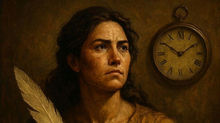Weaving the Modern Image of Indian Women through Poetry - Reshma Ramesh's Poetry Event at 55th International Cairo Book Fair
- Web Portal Eastern Pearl

- Feb 4, 2024
- 2 min read
Cairo International Book Fair - The Diwan of Poetry Hall at the 55th Cairo International Book Fair recently played host to a captivating Poetry Encounter Symposium featuring the renowned Indian poet Reshma Ramesh. The symposium, moderated by writer and academic Dr. Sarah Hamid Hawass, explored the modern image of Indian women as portrayed through Ramesh's poetry.

Cairo International Book Fair - The Diwan of Poetry Hall at the 55th Cairo International Book Fair recently played host to a captivating Poetry Encounter Symposium featuring the renowned Indian poet Reshma Ramesh. The symposium, moderated by writer and academic Dr. Sarah Hamid Hawass, explored the modern image of Indian women as portrayed through Ramesh's poetry.
A Multilingual Poet
Reshma Ramesh, hailing from the Indian city of Udupi, paints a vivid picture of India's rich cultural heritage through her poems. Despite speaking and writing in both Kannada and English, Ramesh chooses English as her poetic medium. Her decision echoes a belief that transcends linguistic boundaries – she sees herself as an ambassador, using her poetic voice to showcase India's diverse culture to the world.
Beyond Poetry: Dentist and Photographer
Unveiling layers of her identity, Ramesh, in addition to being a poet, is a dentist with a keen eye for photography. She carries her camera on her journeys, capturing the natural beauty of landscapes, mountains, and rivers. Ramesh's affinity for such scenes may well be influenced by her hometown, Udupi, known for its picturesque surroundings. Through her poetry, one discovers her love for spontaneous, expressive moments, often depicted in scenes of children playing in the rain or on sandy beaches.
Precision and Empathy
Comparing poetry to the precision required in dentistry, Ramesh finds a parallel between her two worlds. Her background in dentistry, she explains, has heightened her understanding of people's pain, fostering empathy that finds expression in her poetry. For Ramesh, poetry becomes a medium to convey the shared human experience and connect on a deeper level.
Language and Colonial Legacy
Reflecting on the linguistic diversity of India, Ramesh acknowledges the impact of colonialism, which imposed the English language on the nation. With approximately 120 languages and 230 sub-languages, the poet defends her choice to write in English, emphasizing the global reach of the language. Awards, she claims, hold little significance for her, emphasizing the deeper purpose of her poetic message.

Nature's Influence
Ramesh's connection to nature is deeply rooted in her childhood experiences. Despite living in the city, regular visits to her grandparents in the village exposed her to a life devoid of modern communication tools. Her poetry often reflects the simplicity and purity found in those natural settings, drawing inspiration from the sea, silence, and contemplation.
Folklore and Tradition
The influence of her grandmother's natural, folkloric life is evident in Ramesh's work. Old folk songs and traditional customs have woven their way into her poetry, creating a tapestry of melodies and music that resonate in her verses. Pain and cruelty, she reveals, serve as catalysts for her poetic expressions, turning personal experiences into powerful poetry.
Prepared by: Ana Stjelja
Source: Elbalad News
Photos: Reshma Ramesh Instagram





















































Comments